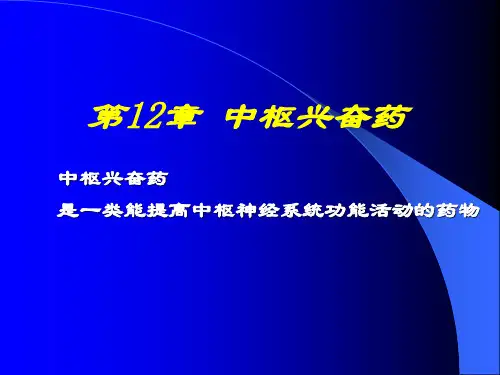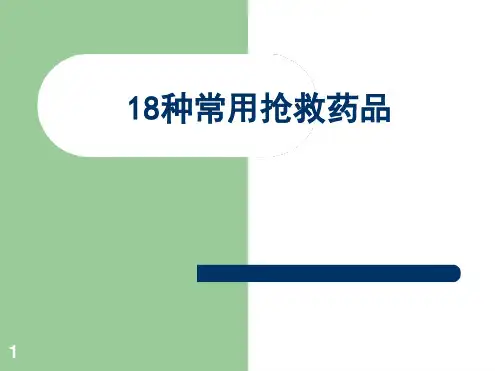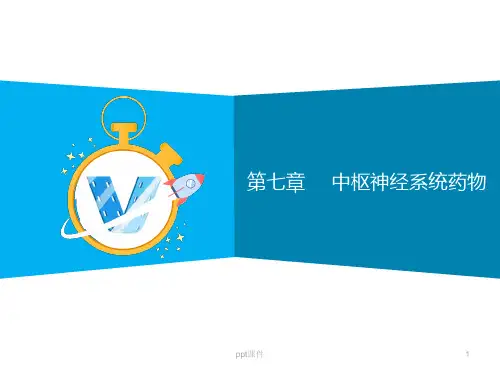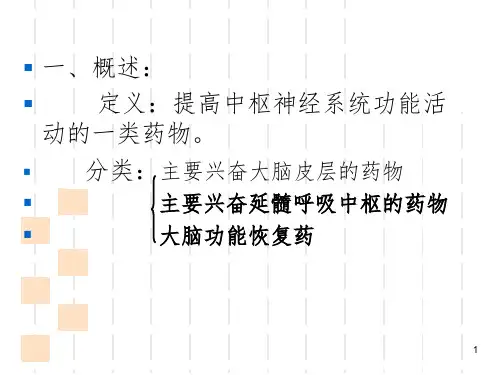18中枢兴奋药 PPT课件
- 格式:ppt
- 大小:187.01 KB
- 文档页数:14

人工智能是否能取代人类英语作文Can Artificial Intelligence Replace Humans?In recent years, the development of artificial intelligence (AI) has brought about numerous innovations and has significantly impacted various aspects of human life. With the advancements in machine learning, deep learning, and natural language processing, AI systems have become increasingly sophisticated and capable of performing complex tasks that were previously thought to be exclusive to humans. This has raised the question of whether AI has the potential to completely replace humans in various fields, including language-related tasks such as writing, translating, and interpreting.One of the most common arguments in favor of AI replacing humans in language-related tasks is its efficiency and speed. AI systems can process and analyze vast amounts of data in a fraction of the time it would take a human to do the same task. This has led to the development of AI-powered writing assistants, translation tools, and language processing applications that can generate content, translate texts, and interpret speeches with high accuracy and speed. In addition, AI systems can continuously learn and improve their performance throughtraining and feedback, making them potentially more reliable and consistent than humans in some language-related tasks.Furthermore, AI systems can overcome many limitations that humans face in language-related tasks, such as language barriers, fatigue, and subjective biases. AI-powered translation tools can instantly translate text or speech from one language to another, enabling seamless communication between people who speak different languages. AI writing assistants can help users improve their writing skills by providing real-time feedback on grammar, style, and tone. AI interpretation systems can accurately interpret speeches in real-time, facilitating communication in multilingual environments. Overall, AI systems have the potential to enhance communication and break down language barriers in ways that were previously unimaginable.However, despite the advancements in AI technology, there are still many aspects of language-related tasks that AI struggles to replicate or surpass humans. One of the main challenges for AI in language-related tasks is understanding context, nuance, and cultural subtleties in communication. Language is complex and dynamic, and the meanings of words and phrases can vary depending on the context, tone, and cultural background. Humans have the ability to interpret and adapt to these nuances,whereas AI systems often struggle to grasp the subtleties of human communication, leading to errors or misunderstandings in their output.Moreover, AI systems lack the creativity, emotional intelligence, and social skills that are essential for effective communication and understanding in human interactions. Writing engaging and persuasive content, translating literary works, or interpreting sensitive conversations require a level of creativity, empathy, and intuition that AI currently lacks. While AI systems can generate text based on patterns and data, they often lack the depth, originality, and emotional resonance that human writers, translators, and interpreters bring to their work.Furthermore, there are ethical and societal implications to consider in the debate over whether AI can replace humans in language-related tasks. The widespread adoption of AI systems in language-related tasks could lead to job displacement, economic inequality, and loss of human creativity and spontaneity in communication. While AI can enhance productivity and efficiency in some tasks, it is crucial to ensure that AI systems are used responsibly and ethically to complement human capabilities rather than replace them.In conclusion, while AI has made significant advancements in language-related tasks and has the potential to enhance communication and break down language barriers, it is unlikely to completely replace humans in these areas. Humans possess unique abilities such as creativity, emotional intelligence, and cultural understanding that are essential for effective communication and interpretation in language-related tasks. AI systems can complement human capabilities and enhance productivity, but they cannot fully replicate the complexity, depth, and richness of human communication. As technology continues to evolve, it is essential to strike a balance between the benefits of AI and the importance of preserving human skills and values in language-related tasks. AI should be viewed as a tool to enhance and augment human capabilities, rather than a substitute for human creativity and communication.。







